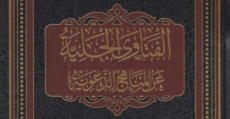Reference: http://www.sahab.net/forums/index.php?showtopic=97944
Question: Sayyid Qutb – a man who has become known in the Islamic World as an [Islamic] intellectual. However the people have differed about him, some of them praise and exalt him whilst others criticise him severely. O our Shaykh, we hope from you that you give us a clear clarification regarding this subject.[1] What should the position of a Muslim be regarding this man? This is because Sayyid had a major effect on the Islamic World; his books also have a large influence. We therefore request from your eminence to shed some clarity.
Response: Firstly, may Allaah bless you, I don’t consider it correct that disputes, discord and debates between the Muslim youth should be regarding individuals and personalities – neither Sayyid Qutb nor other than Sayyid Qutb. Rather the discussion and dispute should be over the Islamic Ruling. For example, a statement of Sayyid Qutb or other than Sayyid Qutb should be put forward and we then say: Is this statement correct or is this statement false? Then we analyse this; if it is true we accept it, and if it false then we reject it. As for the dispute and discord between the youth being over accepting or rejecting a specific man then [this] is wrong and a grave error.
Sayyid Qutb is not infallible from mistakes. Similarly those scholars who are greater than him, they are not infallible, and those who are much less than the scholars are not infallible. The statement of every individual can be accepted or rejected except whom? Except the Messenger of Allaah (sal Allaahu alayhi wa sallam). It is obligatory to accept his statement in all cases.
For this reason I forbid the youth that the basis of their disputes and arguments be regarding a specific personality, no matter who he is. This is because if the arguments are on this basis, then maybe the person who is arguing will falsify a true statement that the person made, or maybe he will aid a false statement that the person said, and this is dangerous. Why?
Because if a person attaches himself to a particular individual, and another person does the same with one who opposes him, then the person who is against him will attribute to him something he did not say, or interpret his speech [to mean what it does not mean] or other things similar to this. And the other person may deny what the person has said, or interpret it away from the falsehood of his statement.
So I say: Let us not talk about individuals, or attach ourselves to individuals. Sayyid Qutb has gone from the World of Actions to the World of Recompense, Allaah will be his judge – and similarly the judge of other People of Knowledge.
As for the truth, then it is obligatory to accept whether it comes from Sayyid Qutb or other than him. Similarly, falsehood must be rejected whether it comes from Sayyid Qutb or other than him. Any written or heard falsehood must be warned against regardless of this person or that person, it must be rejected from every individual.
This is my sincere advice to our brothers; that it is not appropriate your conversations, debates, accepting and rejecting be on the basis of a particular individual.
Question: What is your opinion regarding his works?
Response: As for Sayyid Qutb, my opinion regarding his works is that they are like the words of others, they contain some truth and some falsehood; nobody is infallible. His works, however, are not like the works of Shaykh Muhammad Naasirudeen al-Albaanee, the difference between them both is like the difference [between] the heavens and earth. The works of the first man (Sayyid Qutb) are more literary and academic. He didn’t possess what Shaykh al-Albaanee possesses in terms of knowledge and accuracy in transmitting knowledge.
So I consider it correct that the truth is accepted from every individual, and falsehood is rejected from every individual. It is not appropriate for us and it is not Islamically permissible for us to base our arguments, debates, discord, separation and unity upon the names of men. Yes.
Footnotes
[1] The objective behind translating this article is not a defence of Sayyid Qutb, rather the much needed solution that Shaykh Ibn Uthaymeen offered in ending the continual disputes, discord and separation between many brothers and sisters within the Salafi community. Discord and separation which – as Shaykh Ibn Uthaymeen described – are often based on adopting stances on specific personalities whom the scholars themselves have differed over and then testing and forcing others upon this.
The ruling of such disputes has been clarified by Shaykh AbdulMuhsin al-Abbaad:
“It is not permissible for any student of knowledge to make ‘imtihaan’ (test) of another person that he should take a position regarding a person who has been refuted or the one who refutes; if a person agrees with this student of knowledge [in his position] then he is safe, and if he does not agree with him then his is considered to be an innovator and boycotted.”
ref: https://madeenah.com/article.cfm?id=1394
نصيحة الشيخ ابن عثيمين عن الإختلاف حول الأشخاص
المرجع:http://www.sahab.net/forums/index.php?showtopic=97944
السؤال: سيد قطب رجل ظهر على العالم الإسلامي بفكر، واختلفوا فيه الناس بين ممجد وقادح قدحاً شديداً جداً، فنود أن يبين شيخنا لنا بيان وافي عن هذا الموضوع، وكيف يكون موقف المسلم نحو الرجل؛ لأن سيداً له أثر في العالم الإسلامي، وله آثار من كتب ومؤلفات فنريد بياناً من فضيلتكم؟
الجواب: أولاً بارك الله فيكم! لا أرى أن يكون النزاع والخصومة بين الشباب المسلم في رجل معين، لا سيد قطب ولا غير سيد قطب ، بل النزاع يكون في الحكم الشرعي، فمثلاً: نعرض قول من الأقوال لـ قطب أو لغير قطب ، ونقول: هل هذا القول حق أو باطل؟ ثم نمحصه إن كان حقاً قبلناه وإن كان باطلاً رددناه، أما أن تكون الخصومة والنزاع بين الشباب، والأخذ والرد في رجل معين فهذا غلط وخطأ عظيم.
فـسيد قطب ليس معصوماً، ومَن فوقه من العلماء ليسوا معصومين، ومَن دونه من العلماء ليسوا معصومين، وكل أحد يؤخذ من قوله ويترك إلا من ؟ إلا رسول الله صلى الله عليه وعلى آله وسلم، فيجب قبول قوله على كل حال. فلذلك أنا أنهى الشباب أن يكون مدار نزاعهم وخصوماتهم على شخص معين أياً كان؛ لأنه إذا كانت الخصومات على هذا النحو فربما يُبْطل الخصم حقاً قاله هذا الشخص، وربما يَنْصُر باطلاً قاله هذا الشخص، وهذا خطر عظيم؛ ليش ؟
لأنه إذا تعصب الإنسان للشخص وتعصب آخر ضده، فالذي يتعصب ضده سوف يقول عنه ما لم يقله، أو يؤول كلامه، أو ما أشبه ذلك، والثاني ربما يُنْكِر عنه ما قاله، أو يوجه ما قاله من الباطل. فأنا أقول: لا نتكلم في الأشخاص، ولا نتعصب لأشخاص، و سيد قطب انتقل من دار العمل إلى دار الجزاء، والله تعالى حسيبه، وكذلك غيره من أهل العلم. أما الحق فيجب قبوله سواء جاء من سيد قطب أو من غيره، والباطل يجب رده سواء كان من سيد قطب أو من غيره، ويجب التحذير من أي باطل كُتِب أو سُمِع سواء من هذا أو من هذا، من أي إنسان.هذه نصيحتي لإخواننا، ولا ينبغي أن يكون الحديث والمخاصمة والأخذ والرد في شخص بعينه.
السؤال: ما رأيكم في آثاره ؟
الجواب: أما سيد قطب فرأيي في آثاره أنه مثل غيره، فيه حق وباطل، ليس أحد معصوماً، ولكن ليست آثاره مثلاً كآثار الشيخ محمد ناصر الدين الألباني مثلا فبينهما كما بين السماء والأرض، فآثار الرجل الأول هي عبارة عن أشياء أدبية وثقافية عامة، وليس عنده كما عند الشيخ الألباني في التحقيق والعلم.
ولذلك أنا أرى أن الحق يؤخذ من كل إنسان، والباطل يُرَد من كل إنسان، وأنه لا ينبغي لنا بل ولا يجوز لنا أن نجعل مدار الخصومة والنزاع والتفرق والائتلاف هو أسماء الرجال , نعم.


